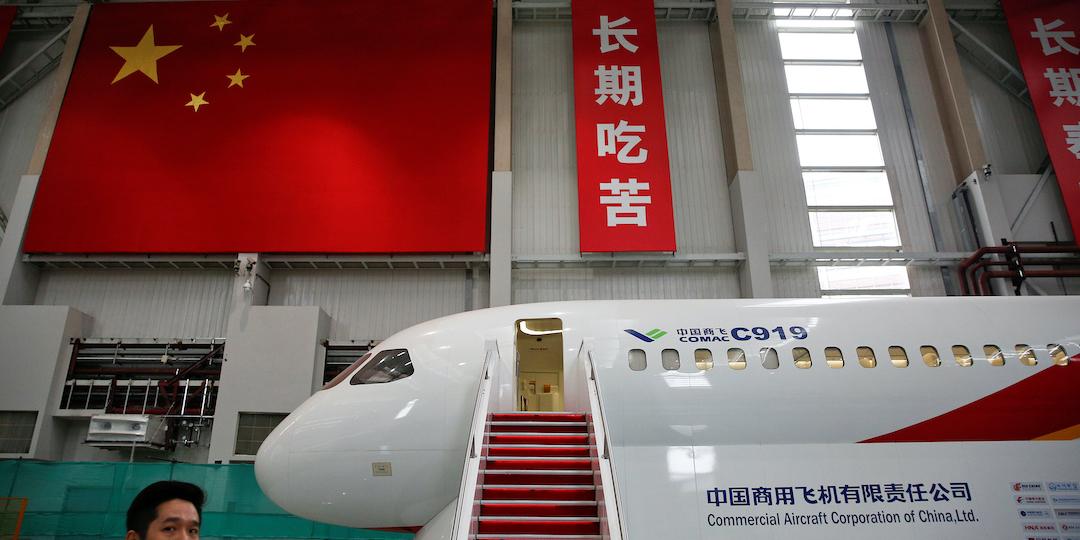By akademiotoelektronik, 26/05/2022
COMAC, the Chinese aircraft manufacturer that reconciles Airbus and Boeing
Will the Airbus-Boeing duopoly have to make room for the newcomer COMAC? The rise of China in the highly strategic aeronautics sector, of which it represents the world's largest market, has led Europeans and Americans to close ranks. On Tuesday, the United States and the European Union suspended for five years the punitive customs duties they are imposing on themselves in the context of the old dispute between them on public aid to their aircraft manufacturers.
According to US President Joe Biden, it is a question of "working together to challenge and counter China's non-commercial practices in the (aeronautics) sector, which give Chinese companies an unfair advantage".
The emergence of a national aircraft manufacturer
Against the backdrop of Beijing's relentless efforts to bring out its national aircraft manufacturer COMAC (Commercial aircraft Corporation of China). It is developing a dual engine, the C919, to compete with the A320 and B737. After four years of flight testing, COMAC expects to obtain certification of the C919 in China this year, in time to commemorate the centenary of the creation of the Chinese Communist Party.
The aircraft received between $49 billion and $72 billion in government subsidies for its development, much more than the aid that Airbus and Boeing received, according to the calculations of Scott Kennedy, a specialist in China at the International Centre for Strategic Studies (CSIS). According to Richard Aboulafia, aviation expert for Teal Group, "the real problem is that China is manipulating the market by playing Airbus and Boeing against each other and conditioning its orders on technology transfers."
Chinese air traffic explodes

China's air traffic, which has exploded and recovered faster than other regions from the health crisis, is expected to grow even more. Boeing estimates that the Chinese market needs only 9,360 aircraft over the next 20 years, or 20% of the world's demand for new aircraft. A major outlet for the Airbus A320 and the Boeing 737 Max, while the latter has still not obtained permission to return the aircraft in flight to the Chinese sky.
If Beijing cannot do without Boeing or Airbus for the moment, it will eventually be in control of its own destiny.
"the Chinese have the ambition, they are very reasonable, they know it takes time," he told AFP: "it is not in 2025 that they want to fight with Airbus and Boeing."
Dependent on European and American industrialists
The C919 depends on cooperation with European and American manufacturers: of the 82 major equipment manufacturers of the aircraft, 14 are Chinese, seven of which are joint ventures with a foreign company, according to Scott Kennedy. The wings and fuselage are Chinese, but national companies do not yet control the engines or avionics and COMAC suffers from its bureaucratic organization. But it will come, says Michel Merluzeau. "they prepare their industry to meet national needs. They will be products of inferior quality, but at least they will be national," says Richard Aboulafia to AFP. Heavier, the aircraft consumes more fuel and therefore costs more to operate.
Under the influence of the government, COMAC prides itself on having registered 815 orders for its C919, almost all of them with Chinese companies. But for the most part these are only intentions: China Eastern Airlines was the first airline in March to place a firm order for five aircraft.
Emergence of an "ABC model"
A professor at the Beihang Aeronautics University in Beijing, Huang Jun "doesn't think (the C919) changes the game" with Western aircraft manufacturers but will contribute to the emergence of an "ABC Airbus, Boeing and COMAC model": "we just hope to be able to join this market and occupy a certain share of it," he says.
The bosses of both Boeing and Airbus are preparing for this. COMAC "will gradually become an actor worthy of the name", the President of European manufacturer Guillaume Faury recently said. "we will probably move from a duopoly to a" triopoly ", at least on the single corridors, by the end of the decade."
(with AFP)
latribune.fr4 minutes
Share:
Related Articles